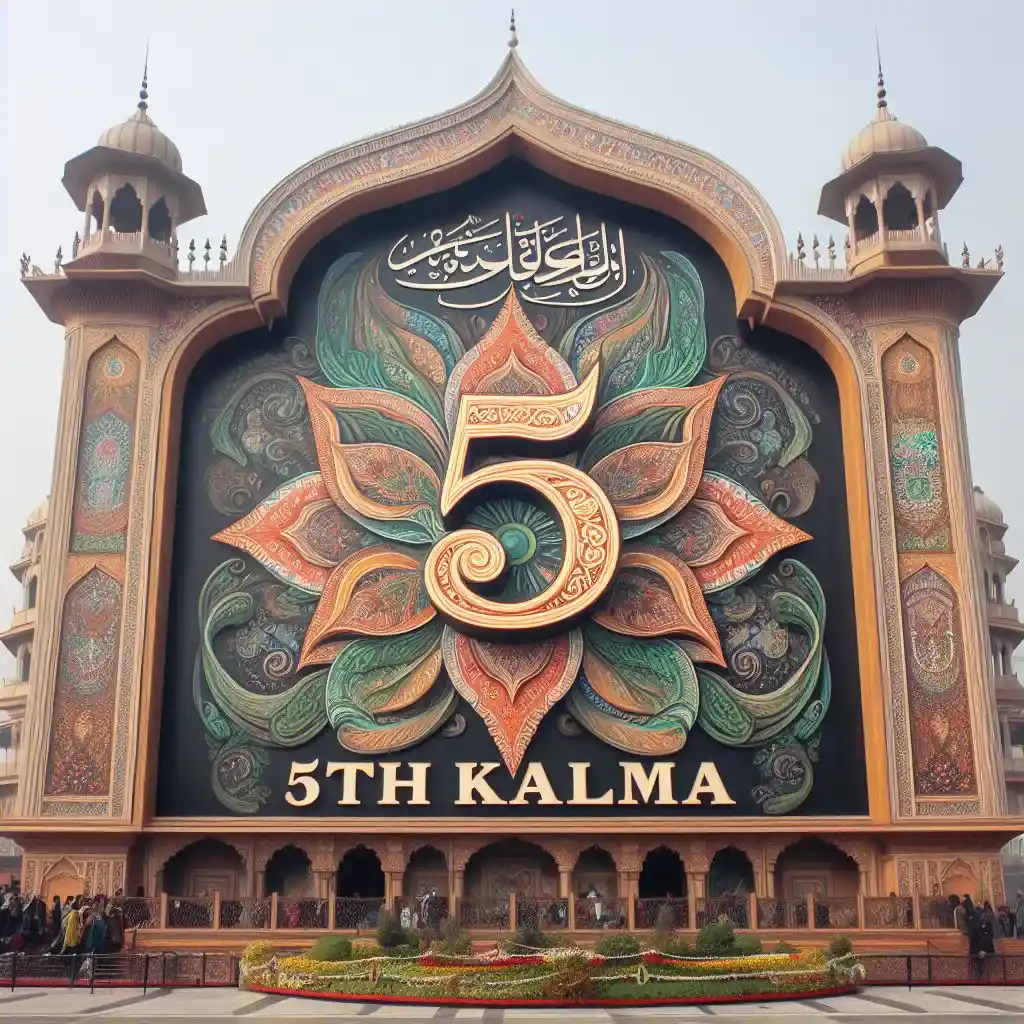In the tapestry of Islamic faith, seeking forgiveness plays a central role. The 5th kalma, also known as Astaghfar, serves as a potent bridge for Muslims to connect with Allah (God) and express remorse for their transgressions. This seemingly simple phrase carries immense weight, offering a path towards inner peace, spiritual refinement, and ultimately, Allah’s divine mercy.
The Heart of Astaghfar
The Arabic words “Astaghfirullah Rabbi Min Kulli Dhambin” resonate with a profound meaning: “I seek forgiveness from Allah, who is my Lord, from every sin.” Astaghfar transcends a mere apology. It signifies acknowledging one’s shortcomings, expressing deep regret, and making a conscious effort towards self-improvement. By regularly reciting the 5th kalma, Muslims reaffirm their dependence on Allah’s guidance and seek pardon for past mistakes, both intentional and unintentional.
Blooming Benefits of Reciting the 5th Kalma
The act of seeking forgiveness through Astaghfar brings forth a multitude of benefits in a Muslim’s life:
- Inner Tranquility and Emotional Well-being: Acknowledging and releasing past missteps can be incredibly liberating. Reciting the 5th kalma fosters a sense of inner peace and allows one to move forward with a lighter heart.
- Strengthened Faith and Deeper Connection with Allah: Seeking forgiveness demonstrates humility and submission to Allah’s will. Regularly reciting the 5th kalma bolsters faith and deepens the connection between a believer and Allah.
- Seeking Allah’s Mercy and Guidance: Astaghfar is a heartfelt plea for Allah’s mercy and forgiveness. By acknowledging one’s shortcomings, a believer opens themself to receive Allah’s guidance and blessings.
- Purification of the Soul: The act of seeking forgiveness is a form of spiritual cleansing. By regularly reciting the 5th kalma, Muslims strive to purify their hearts and intentions, drawing closer to Allah.
Integrating Astaghfar into Daily Life
The beauty of Astaghfar lies in its simplicity and accessibility. Muslims can seamlessly integrate this powerful expression into their daily routine in various ways:
- Reciting it upon waking up and before going to sleep.
- Saying it after committing a mistake, no matter how big or small.
- Incorporating it into their daily prayers.
- Making it a habit to recite Astaghfar throughout the day, especially during moments of difficulty or temptation.
A Personal Reflection (Optional)
(Include a brief personal story about the impact of reciting the 5th kalma in your life. This could be a time when seeking forgiveness through Astaghfar helped you overcome a challenge or brought you peace.)
A Lifelong Journey of Forgiveness
The 5th kalma is a precious gift for Muslims, offering a continuous path towards forgiveness and spiritual growth. By incorporating Astaghfar into their daily lives, Muslims can cultivate a deeper connection with Allah, experience inner peace, and seek His infinite mercy. As they navigate the journey of life, Astaghfar serves as a constant reminder of Allah’s compassion and the importance of seeking forgiveness throughout their earthly existence.
| The 1st Kalma: Cornerstone of Faith in Islam |
| Kalma Shahadat |
| 3rd kalma in arabic |
| The 4th Kalma: A Foundation of Faith |
Five Kalma in Arabic with Urdu
کلمہ استغفار یا استغفار کلمہ، اسلامی دنیا میں ایک اہم روحانی اظہار ہے. جو اللہ سے مغفرت طلب کرنے کے لئے استعمال ہوتا ہے۔ یہ کلمہ ایک اختصار ہے . جو انسان کی گناہوں سے توبہ کرنے اور اللہ کے سامنے پیش کرنے کے لئے استعمال ہوتا ہے۔
کلمہ استغفار کی تکرار ایمانی کمزوریوں سے بچانے اور دنیا اور آخرت میں برکتیں لانے میں مدد فراہم کرتی ہے۔ یہ کلمہ ہمیں ہماری کمیونیکیشن میں اللہ کی طرف سے مغفرت کی طلب کرنے کی طرف ہدایت دیتا ہے۔
کلمہ استغفار کی تلاوت اور استعمال سے انسان کا انتہائی قریبی تعلق اللہ کے ساتھ مضبوط ہوتا ہے . اور اس کی روحانیت میں اضافہ ہوتا ہے۔ یہ کلمہ ایک شخص کو اسلامی اعتقاد کی پسماندگی سے بچانے , اور اس کی روحانی طرف بڑھنے میں مدد فراہم کرتا ہے . اور یہ اسلامی تعلیمات کی روزانہ کی عبادات کا اہم حصہ بنتا ہے۔

5th Kalma in arabic text:


5th fifth Kalma in Arabic:
استغفر الله ربي من كل ذنب أذنبته عمدًا أو خطأ سرًّا أو علانية وأتوب إليه من الذنب الذي أعلم ومن الذنب الذي لا أعلم إنك أنت علام الغيوب وستار العيوب وغفار الذنوب ولا حول ولا قوة إلا بالله العلي العظيم

5th kalma in arabic transliteration:
Astaghfirullah Rabbi min kulli dhambin adhnabtuhu amadan aw khataan sirran aw ‘alaaniyatan wa atoobu ilayhi min al-dhambi allathee a’lamu wa min al-dhambi allathee la a’lamu innaka anta ‘allamu al-ghuyoobi wa sattaaru al-‘uyuubi wa ghaaffaaru al-dhunoobi wa laa hawla wa laa quwwata illa billahil ‘aliyyil ‘a dh eem.
5th kalma in arabic with tarjuma :
میں اپنے رب اللہ سے ہر گناہ کی مغفرت چاہتا ہوں. چاہے وہ میرے ذریعے جان بوجھ کر کیا گیا ہو, یا خود سے غافلی سے ہو، چاہے وہ خفیہ ہو یا علنیہ۔ میں اسے اس سے توبہ کرتا ہوں جو میں جانتا ہوں . اور اس سے توبہ کرتا ہوں جو مجھے معلوم نہیں ہے۔ بیشک، تو غیب کا جاننے والا ہے، خوبصورتیوں کا پردہ ہے، اور گناہوں کی معافی دینے والا ہے۔ بے شک، االلہ تعالٰی سے کوئی قوت اور طاقت نہیں، مگر اللہ عزوجل ہی کی ہے، علی العظیم ہے۔
5th kalma in arabic in English translation:
I seek forgiveness from Allah, my Lord, for every sin I committed knowingly or unknowingly, secretly or openly. I repent to Him for the sins I am aware of and the sins I am not aware of. Surely, you are the Knower of the unseen, the Concealer of faults, and the Forgiver of sins. There is no power and no strength except through Allah, the Highest, the Greatest.
benefits of Five kalma in arabic
The specific benefits of reciting and using Kalma astaghfar are:
- This prayer strengthens communication and helps to seek Allah’s mercy and forgiveness.
- The repetition of the word ‘forgiveness’ increases man’s spirituality and brings blessings to his later life.
- The recitation of this word strengthens faith and allows man to repent of SINS.
- The daily recitation of the word astaghfar also makes it easy for man’s worldly troubles and increases happiness.
- This prayer helps man to live according to islamic teachings and enhances his spirituality.
5th kalma in arabic with tarjuma
:کلمہ استغفار کی تلاوت اور استعمال کے مخصوص فوائد یہ ہیں
یہ دعارابطے کو مضبوط کرتی ہے اور اللہ کی رحمت اور مغفرت طلب کرنے میں مدد فراہم کرتی ہے۔
کلمہ استغفار کی تکرار سے انسان کی روحانیت میں اضافہ ہوتا ہے . اور اس کی آخرتی زندگی میں برکتیں آتی ہیں۔
اس کلمے کی تلاوت ایمان کو مضبوط کرتی ہے اور انسان کو گناہوں سے توبہ کرنے کی اجازت دیتی ہے۔
کلمہ استغفار کی روزانہ کی تلاوت سے انسان کی دنیاوی مشکلات میں بھی آسانی آتی ہے اور خوشیاں بڑھتی ہیں۔
یہ دعا انسان کو اسلامی تعلیمات کے مطابق زندگی گزارنے میں مدد فراہم کرتی ہے . اور اس کی روحانیت کو بڑھاتی ہے۔
FAQs:
The 5th kalma, also known as Astaghfar, is a powerful Islamic phrase that translates to “I seek forgiveness from Allah, who is my Lord, from every sin.” It’s more than just saying “sorry”; it signifies acknowledging mistakes, expressing sincere regret, and striving for self-improvement. By reciting the 5th kalma, Muslims reaffirm their dependence on Allah’s guidance and seek pardon for past transgressions, both intentional and unintentional.
Seeking forgiveness is a cornerstone of Islamic faith. Astaghfar offers a multitude of benefits for Muslims, including:
Inner peace and emotional well-being: Letting go of past mistakes fosters a sense of calm and allows one to move forward with a lighter heart.
Strengthened faith and a deeper connection with Allah: Seeking forgiveness demonstrates humility and submission to Allah’s will, deepening the believer’s connection with God.
Seeking Allah’s mercy and guidance: Astaghfar is a heartfelt plea for Allah’s forgiveness and guidance, opening oneself to blessings.
Purification of the soul: Regularly reciting the 5th kalma is a form of spiritual cleansing, helping Muslims purify their hearts and intentions.
The beauty of Astaghfar lies in its simplicity. Here are some ways to seamlessly integrate it into your daily routine:
Recite it upon waking up and before going to sleep.
Say it after committing a mistake, no matter how big or small.
Incorporate it into your daily prayers.
Make it a habit to recite Astaghfar throughout the day, especially during moments of difficulty or temptation.
Remember, Astaghfar is a lifelong journey of seeking forgiveness and spiritual growth. By incorporating it into your daily life, you can cultivate a deeper connection with Allah and experience the immense peace and blessings it offers.




